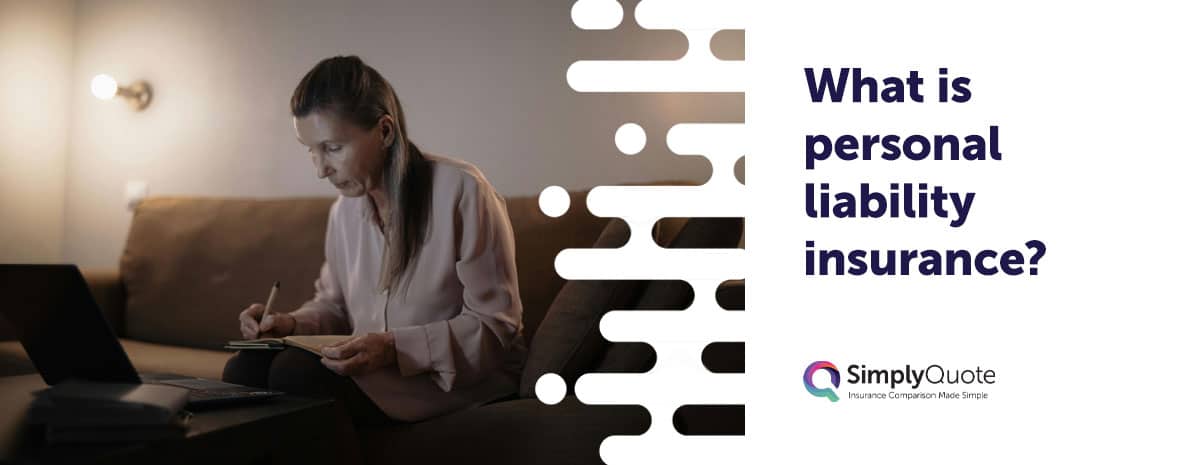What is personal liability insurance?
Personal liability insurance protects you if you accidentally cause injury to someone else or damage their property—and they hold you legally or financially responsible.
It typically covers legal defence costs, compensation payouts, and medical expenses up to your policy limit.
Unlike business liability insurance, which covers incidents arising from professional activities, personal liability insurance is designed for everyday life. It’s often included as part of home insurance or renters’ insurance policies, though standalone or umbrella versions are available too.
Let’s say a guest trips over a rug in your hallway and suffers a serious injury—or your child accidentally breaks a neighbour’s window. If a claim is made against you, your personal liability insurance steps in to handle the legal costs and any compensation awarded. Without it, you’d be footing the bill from your own savings.
This type of cover is particularly important for families, pet owners, landlords, or anyone whose lifestyle involves frequent interaction with guests, neighbours, or the general public.
In this guide, we’ll explain how personal liability insurance works, what it covers (and doesn’t), how it compares to other types of liability protection, and when it’s worth having in the UK.

How does personal liability insurance work?
If someone makes a claim against you for injury or property damage, personal liability insurance helps cover the legal defence, settlement, and compensation costs—so you don’t have to pay them personally.
It kicks in when an incident happens and you’re found legally responsible.
Here’s how it works in practice:
Imagine a guest slips on a wet patch in your kitchen and breaks their wrist. They decide to pursue a claim. If you have personal liability insurance, your insurer will step in to manage the process. This includes:
- Appointing and paying for a solicitor
- Handling negotiations with the injured party’s legal team
- Covering medical bills, compensation, or property repair costs
- Paying court-awarded damages (up to your policy limit)
Policies usually come with a cover limit—often £1 million or more—and may also cover claims made abroad, depending on the provider. Most policies carry no excess, meaning you won’t have to pay anything upfront.
It’s worth noting: liability isn’t always obvious. Even if you didn’t mean to cause harm, you can still be held accountable. That’s why personal liability insurance is designed to protect you when mistakes or accidents turn into costly legal issues.
Looking to compare public liability insurance? Get your quote today!
Get QuotesWhat does personal liability insurance typically cover?
Personal liability insurance covers you if someone is injured or their property is damaged because of something you did—or failed to do—and they hold you responsible.
It’s there to protect you against everyday mishaps that could lead to expensive claims.
Here are some common situations where cover may apply:
- Someone trips on your driveway and suffers a serious injury
- Your child breaks a neighbour’s window while playing football
- Your dog knocks someone over in the park, resulting in a broken bone
- You accidentally spill wine on a friend’s laptop while visiting their home
- A house guest is injured on your property due to a loose floorboard
Most policies cover:
- Legal defence and court costs
- Medical expenses of the injured party
- Repair or replacement of damaged property
- Compensation payouts for pain, suffering, or lost income
- Incidents that occur both at home and away, unless specifically excluded
Coverage usually applies worldwide, although some restrictions may exist. Always check the territorial limits of your policy.
Whether you own a home, rent a flat, or live with others, personal liability insurance can quietly protect you from the legal and financial fallout of everyday accidents.
What doesn’t personal liability insurance cover?
Personal liability insurance doesn’t cover everything—and knowing the exclusions is just as important as understanding what’s included.
Most policies are designed to protect you from accidental harm or damage, not deliberate or professional actions.
Here’s what it typically excludes:
- Business-related activities – If you injure someone or damage property while working (e.g. as a tradesperson), you’ll need a separate public or professional liability policy.
- Intentional acts – Any harm or damage caused on purpose won’t be covered.
- Criminal acts or illegal behaviour – If the incident involves a breach of law, your cover is unlikely to respond.
- Injuries to you or your own family – It won’t pay out if you, your partner, or someone else insured under the policy is injured.
- Motor vehicle incidents – Accidents involving vehicles are usually covered under motor insurance, not personal liability.
Many policies also limit:
- Liability arising from certain dog breeds
- Claims that occur in business premises or rented commercial spaces
- Liability from aircraft, boats, or other specialised property
Always check your policy wording. Some providers offer extended options or umbrella coverage to fill specific gaps.
Do I need personal liability insurance in the UK?
You’re not legally required to have personal liability insurance in the UK—but if you regularly have visitors, own pets, rent or own a home, or have kids, it’s a highly recommended layer of protection.
One accident could cost you thousands—especially if a claim ends up in court.
Let’s say someone slips on your icy front path. Or your child accidentally injures a classmate. Or your dog bolts at the park and knocks over a cyclist. These aren’t extreme hypotheticals—they’re everyday situations with legal consequences.
If you’re a homeowner, landlord, or someone who hosts guests—even casually—personal liability insurance gives you cover when your normal isn’t so normal. For renters, it’s often bundled into tenant insurance. For homeowners, it typically sits within buildings or contents policies—but not always by default.
It’s particularly valuable if:
- You have children or pets
- You own or rent a property
- You travel regularly
- You want legal protection against third-party claims
- You want peace of mind in case of unexpected legal action
While many people assume “that’ll never happen to me,” claims do happen. And when they do, having cover can mean the difference between an apology and a lawsuit.
How is personal liability insurance different from public liability or employers’ liability?
Personal liability insurance protects you as a private individual, while public and employers’ liability insurance cover risks related to business activities or employment.
They may sound similar—but they serve very different purposes.
Here’s the breakdown:
- Personal liability insurance
Covers incidents in your private life. For example, a guest trips in your home, your child damages someone’s property, or your dog injures someone in the park. It’s typically bundled with home or renters insurance. - Public liability insurance
Designed for businesses and self-employed people. It covers injuries or property damage caused to third parties during the course of work—for instance, a plumber damaging a client’s floor, or a market trader whose stall injures a passer-by. - Employers’ liability insurance
Legally required if you employ staff in the UK. It protects you if an employee suffers illness or injury due to their work. It has nothing to do with members of the public—or personal scenarios.
The key difference? Personal liability protects your lifestyle. Public and employers’ liability protect your business. If you’re both a homeowner and a sole trader, you may need both types of cover—each for different risks.
What is the typical cost and cover limit for personal liability insurance?
In the UK, personal liability insurance is usually included in home or renters insurance policies—with cover limits commonly ranging from £1 million to £2 million as standard.
As a standalone policy, it’s rare—but can sometimes be added via an umbrella or specialist plan.
Because it’s bundled, the cost isn’t usually itemised. However, personal liability typically adds less than £20–£30 per year to a household insurance premium. In most cases, the cost is negligible—but the protection it provides is significant.
Typical cover limits include:
- £1 million – Entry-level, often found in basic renters or contents-only policies
- £2 million – Common for homeowners and families
- £5 million+ – May be available as an upgrade, especially under umbrella insurance or for high net-worth individuals
The actual price you’ll pay depends on:
- The insurer and policy type
- Whether you’ve had previous claims
- Your household profile (children, pets, guests, etc.)
- Whether it’s part of a broader home/buildings/contents package
If you’re looking for standalone cover, expect to pay more and face stricter underwriting. But for most people, bundling personal liability into their main home policy is the most cost-effective and straightforward approach.
How do I get personal liability insurance in the UK?
In the UK, personal liability insurance is most commonly obtained as part of a home, contents, or renters insurance policy.
It’s usually bundled in automatically—but the level of cover, exclusions, and availability vary by provider.
Here’s how to get it:
- Homeowners: Look at your buildings or contents insurance. Many standard policies include at least £1 million in personal liability cover. Always check the wording—some may list it under “legal liability to the public.”
- Renters and tenants: Contents insurance often includes personal liability. If not, some providers offer it as an optional add-on for just a few pounds per year.
- Landlords: Specialist landlord insurance policies may include liability protection—but often for tenant claims only. You may need a separate product for wider third-party cover.
- Umbrella policies: For high-value cover (e.g. £5 million or more), an umbrella policy may provide extended personal liability on top of your main household policy.
- Standalone cover: Rare in the UK. Some specialist insurers offer it, but it’s more common in countries like the US.
Always compare policy limits, territorial coverage, and exclusions. And if you’ve got dogs, pools, or host events, let your insurer know—it may affect the terms or need an extension.
Final thoughts
Personal liability insurance isn’t the loudest or flashiest cover—but when something goes wrong, it’s often the most quietly valuable. One awkward accident, one unexpected claim, one moment of bad luck—and without cover, you could be footing the bill personally.
In the UK, this protection often comes bundled into home, renters, or contents insurance. It’s easy to overlook, but even easier to be grateful for if a guest slips, a child causes damage, or a claim lands on your doorstep.
You may never need to use it. But if you do, it could save you thousands—and the stress that comes with legal or financial fallout. For most people, it’s a small extra layer of protection that quietly does a big job.
Frequently Asked Questions (FAQs)
No. Contents insurance covers your belongings; personal liability insurance covers legal costs if you injure someone or damage their property. They’re often bundled, but they protect different things.
It can, but not always. Some policies exclude specific breeds or require additional vetting. Always check the policy wording if you have a pet.
It’s uncommon in the UK. Most personal liability cover is bundled with home or renters insurance. Standalone options are limited and typically more expensive.
Some policies include worldwide cover—but not all. Check the “territorial limits” of your policy to see if incidents abroad are included.
Not usually. It’s considered a personal expense, not a business cost. However, if part of your home is used for business, speak to an accountant.
Yes—most policies cover accidental damage caused by children in your household, as long as it wasn’t intentional.
If you own rental properties, your landlord insurance may include liability—but only for tenant-related risks. You may still need separate personal cover.
Yes—if included in your contents insurance. Renters should check their policy includes personal liability, especially if they host guests or have pets.
